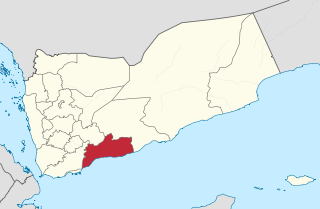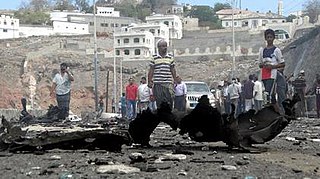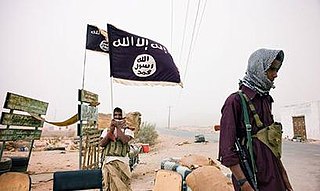In its war on terrorism in Yemen, the US government describes Yemen as "an important partner in the global war on terrorism". There have been attacks on civilian targets and tourists, and there was a cargo-plane bomb plot in 2010. Counter-terrorism operations have been conducted by the Yemeni police, the Yemeni military, and the United States Armed Forces.

Ali Abdullah Saleh was a Yemeni politician who served as the first President of Yemen, from Yemeni unification on 22 May 1990 to his resignation on 25 February 2012, following the Yemeni Revolution. Previously, he had served as President of the Yemen Arab Republic, or North Yemen, from July 1978 to 22 May 1990, after the assassination of President Ahmad al-Ghashmi.

Al-Qaeda in the Arabian Peninsula, or AQAP, also known as Ansar al-Sharia in Yemen, is a militant Islamist organization, primarily active in Yemen and Saudi Arabia. It was named for al-Qaeda, and states it is subordinate to that group and its now-deceased leader Osama bin Laden, a Saudi citizen of Yemeni heritage. It is considered the most active of al-Qaeda's branches, or "franchises," that emerged due to weakening central leadership. The U.S government believes AQAP to be the most dangerous al-Qaeda branch. The group established an emirate during the 2011 Yemeni Revolution, which waned in power after foreign interventions in the subsequent Yemeni Civil War.
The Al-Qaeda insurgency in Yemen refers to the armed conflict that started in 1998 between the Yemeni government with United States assistance, and al-Qaeda-affiliated cells in Yemen. The strife is often categorized as a sub-conflict in the greater Global War on Terror.

The following is a timeline of the 2011–2012 Yemeni revolution from 3 June through 22 September 2011. The Yemeni revolution was a series of major protests, political tensions, and armed clashes taking place in Yemen, which began in January 2011 and were influenced by concurrent protests in the region. Hundreds of protesters, members of armed groups, army soldiers and security personnel were killed, and many more injured, in the largest protests to take place in the South Arabian country for decades.

The 2012 Abyan offensive was an offensive by the Yemeni military against Islamist militant forces, possibly including elements of Al-Qaeda in the Arabian Peninsula (AQAP), in the province of Abyan with the purpose of re-capturing the militant-held towns of Zinjibar and Jaʿār.

Jama'at Ansar al-Shari'a, also known as Ansar al-Shari'a, is a Yemen-based umbrella organization which includes units from several militant Islamic groups of al-Qaeda in the Arabian Peninsula (AQAP). In 2011, AQAP created Ansar Al-Sharia as a Yemen-based affiliate focused on waging an insurgency rather than international attacks on the West. In the view of the International Crisis Group, AQAP is "an internally diverse organisation with varying layers of support among the local population" and many AAS members and allies are not committed to AQAP's international agenda.

The Special Security Forces is a paramilitary force in Yemen under the control of the Minister of the Interior, and forms a key part of the Yemeni security establishment. The force was some 50,000 strong as of 2008, before the Yemeni Crisis began, and SSF units are equipped with a range of infantry weapons and armored personnel carriers. The force also has its own extrajudicial detention facilities.
The following lists events that happened during 2014 in Yemen.
The following lists events that happened during 2012 in Yemen.
The following lists events that happened in 2015 in Yemen.
Timeline of the Yemeni Crisis (2011–present) refers to events of the Shia insurgency in Yemen, the 2011 Yemeni Revolution, the Al-Qaeda insurgency in Yemen and the South Yemen insurgency.

The aftermath of the Houthi takeover in Yemen refers to developments following the Houthis' takeover of the Yemeni capital of Sana'a and dissolution of the government, which eventually led to a civil war and the Saudi Arabian-led intervention in Yemen.

The 2015 Sana'a mosque bombings were four suicide attacks on 20 March 2015 in Sana'a, Yemen.

The Aden unrest refers to initially ongoing conflict between Islamist factions, such as al-Qaeda in the Arabian Peninsula, and Islamic State of Iraq and the Levant's Yemen Branch, against the loyalists of president Abd Rabbuh Mansur Hadi and later to conflict between UAE-backed and Saudi-backed factions within the coalition. In 2017, fighting also broke out between factions aligned with different members of the Saudi-led coalition namely Saudi Arabia-backed Abdrabbuh Mansur Hadi and Al-Islah and UAE-backed separatist Southern Transitional Council and Southern Movement.

Shabwah Governorate offensive (2014–present) refers to an ongoing insurgent campaign by AQAP forces to take control of Shabwah Governorate during the Yemeni Civil War.

The Islamic State of Iraq and the Levant – Yemen Province is a branch of the militant Islamist group Islamic State of Iraq and the Levant (ISIL), active in Yemen. ISIL announced the group's formation on 13 November 2014.
On 15 May 2016, a suicide bombing in the southern Yemeni port city of Mukalla, the capital of the Hadhramaut province, killed at least 47 police and injured over 60. The bombing was preceded by an attack, where 15 Yemeni troops were killed in attacks on army positions outside Mukalla. ISIL said, one of its militants blew up a vehicle, packed with explosives, in an army base in the Khalf district at the city's eastern outskirts.
The Hadramaut Insurgency is an ongoing insurgency in Yemen launched by AQAP and ISIL-YP against forces loyal to president Abdrabbuh Mansur Hadi.

The Abyan conflict (2016–present) is a series of clashes between forces of AQAP loyal to Yemeni president Abdrabbuh Mansur Hadi, and forces loyal to Southern Movement for the control of Abyan.









